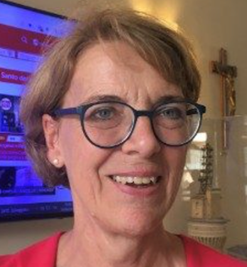 A report of the evening by Colm Holmes
A report of the evening by Colm Holmes
The Synodal process is not progressing in big steps. Pope Francis’ spontaneous answers in interviews are not helpful. At times we wonder why we should continue to hope that our hierarchical church can be reformed? But the Synodal process which Pope Francis initiated is a participating process and there is no other way to influence.
Having 54 lay women as Voting Participants at a Global Synod of Bishops is a huge step forward. And included in the process is inculturisation which means decentralisation and inclusion of all.
Helena was in the Synod “back office” for the Amazon Synod. This was an eye opener for her as she learnt how the church can be developed is a very interesting and very challenging process. In Latin America there is a long tradition of bishops and laity all involved in the process with several regional conferences. Since the October 2023 Synod there have been many meetings and discussions in Latin America. In contrast, Europe has been rather quiet. The European lay participants wanted a pre-meeting of all the European delegates, but the bishops were initially too busy for such a meeting. But they have finally agreed to a meeting in Linz 28-30 August 2024. This meeting will be for synod participants only, and not open to lay or media.
At present the Instrumentum Laboris (Agenda) is being drafted in Rome by a large group of theologians. It will be interesting to see what will be included and what will be omitted from this draft Agenda. All participants in the Synod can intervene and protest if the agenda fails to include important topics.
10 Study Groups have been taken out of the Synod and will only report in June 2025. These Study Groups include very important issues like Women Deacons and Election of Bishops. To date there is no information about who are in these Study Groups or even if they have met? They are asked to give an introduction to their work to the Synod in October 2024, but will only report in June 2025 (if possible). This effectively takes these issues away from the Synod and leaves them to the curia and pope. This completely undermines the Synod! The obvious solution would be for the Synod to have a THIRD assembly in October 2025 (even if Cardinal Grech has said this will not happen). Vatican ll went on for several years after the participants took charge of the agenda!
The most important topic in Switzerland is the role of women. And they are angry at the exclusion of women from all ordained ministries. Switzerland has a long tradition of democratic processes. Many parishes have lay co-ordinators and lay people perform baptisms, weddings and preach. Many women head up large parishes. They are developing similar structures to the Synodal path in Germany. Especially in the German speaking parts of Switzerland both the clergy and laity participate in governing bodies for the church. There is pressure to set up a Synodality Commission for Switzerland in October. Yet no one wants to work in the Catholic Church or study theology.
Credibility is a key issue for Helena. A lot of her work in Laos and the Philippines with the Swiss International Charity Fastenaktion centers on Human Rights. Catholic institutions have a good reputation and have brought cases to the Human Rights Council. The role of women in our church and institutions is an issue that comes up all around the world. There is a basic call for all people to be included as equals. But credibility is undermined when hierarchical church structures treat women as less than second class.
Martha Heizer thanked Helena for sharing her experiences with us. We wish her all the best for the next Synod. Helena’s hope is indestructible and unstoppable! Amen!
